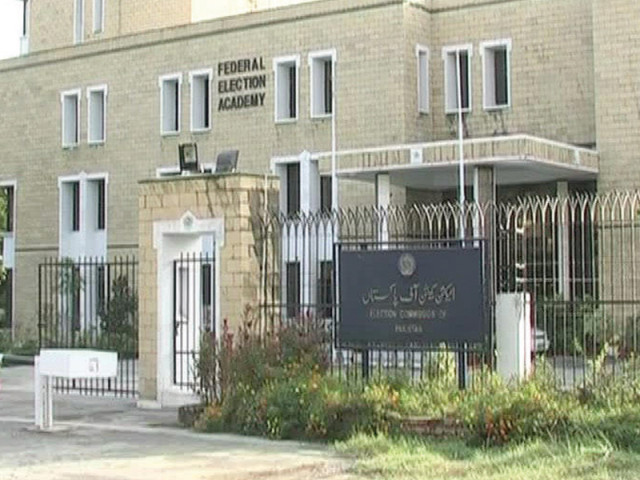Trimmed down: ECP finalises list of poll candidates
Rejects thousands of nominations for NA, provincial assembly seats.

Returning officers (ROs) have also rejected 105 papers filed for 60 reserved seats of the lower house of Parliament and 269 papers filed for reserved seats of the provincial assemblies. PHOTO: FILE
The Election Commission of Pakistan has finalised the list of contesting candidates after rejecting 1,209 nomination papers out of 6,850 valid papers for 272 general seats of the National Assembly and 2,787 nomination papers for the provincial assemblies out of 16,229 valid papers.
Returning officers (ROs) have also rejected 105 papers filed for 60 reserved seats of the lower house of Parliament and 269 papers filed for reserved seats of the provincial assemblies.
There are 10 reserved seats in the National Assembly for minorities and 93 nomination papers filed for these seats have been rejected.
The data revealed that the total number of candidates contesting for general seats of the National Assembly is 23,079. However, this is not the final count yet as the candidates have yet to get the opportunity to withdraw their candidacy.
According to the province-wise breakdown, 147 candidates filed their nomination papers for two general seats of the NA from Islamabad. But 19 have been rejected, leaving 128 as eligible to run for the polls.
The ROs have rejected 105 nominations filed for reserved seats of women in NA and 269 in the provincial assemblies. The total count of valid candidates in the national and provincial assemblies is 812.
Nomination papers of 69 non-Muslims for reserved NA seats and 168 for provincial assemblies have been rejected. The number of valid nominations for NA is 69 and 168 for provincial assemblies.
Punjab ranks on top in terms of the number of papers filed and rejected, as 4,076 candidates had applied for 148 lower house seats, with 620 rejected. The province has 35 reserved seats for women in NA and nomination papers of 10 candidates have been rejected. The number of valid nomination papers is 121.
Regarding the provincial assembly, 9,583 papers were filed for 207 general seats with 1,205 dismissed, leaving 8,378 eligible candidates. Women’s reserved seats stand at 66, with ROs rejecting 10 nomination papers. There are 8 reserved seats for non-Muslims and nomination papers of one candidate have been rejected.
From Sindh, 2,007 candidates filed their candidacy for 61 general NA seats. Out of those, 388 have been dismissed, leaving 1,619 eligible candidates. Some 44 nomination papers for 14 reserved seats for women have been rejected.
The Sindh assembly has 130 general seats, 29 reserved for women and nine for minorities. The ROs have rejected 1,067 nominations filed for the general seats, 121 for women’s seats and 70 for minorities’ seats.
There are 945 candidates who filed nomination papers for 35 general seats of Khyber-Pakhtunkhwa in the NA. The number of rejected is 106, leaving 839 in the field for general seats. The number of reserved seats for women from K-P is eight and 34 nomination papers have been declared invalid.
The provincial assembly has 99 general seats, 22 reserved seats for women and three for non-Muslims. The ROs have rejected 285 nominations for general seats out of 2,572. Nomination papers of 102 candidates for reserved seats for women were rejected.
In the Federally Administered Tribal Areas, 445 candidates filed their papers for 12 general seats of the provincial assembly, with 51 rejected, thus leaving 394 in the field.
The number of candidates who filed for 14 general seats of the NA was 439, out of which 25 have been rejected.
Balochistan Assembly has 51 general seats, 11 reserved for women and three for minorities. The ROs have rejected 230 nominations for general seats, 36 for women’s seats and 23 for minorities.
Legal constraints in publishing defaulters’ names: SBP
A day after the (ECP) disclosed details of politicians’ finances, the State Bank of Pakistan (SBP) informed the poll body of the legal constraints of placing names of defaulters on its website.
“… Before publishing the name of any person in any such list he shall be given prior notice and, if so requests, an opportunity of hearing, said an SBP letter sent to ECP Secretary Ishtiak Ahmed Khan.
The letter added that “due to aforesaid legal constraints and for want of time, the placement of names on the website may not be possible.”
However, SBP Director Shaukat Zaman stated that the central bank was “available for any assistance in the matter”.
Published in The Express Tribune, April 11th, 2013.



















COMMENTS
Comments are moderated and generally will be posted if they are on-topic and not abusive.
For more information, please see our Comments FAQ